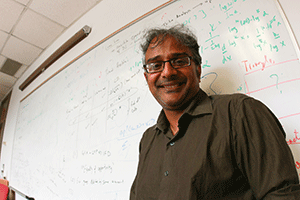
But a team of computer scientists from the University of Utah, University of Arizona and Haverford College in Pennsylvania have discovered a way to find out if an algorithm used for hiring decisions, loan approvals and comparably weighty tasks could be biased like a human being.
The researchers, led by Suresh Venkatasubramanian, an associate professor in the University of Utah’s School of Computing, have discovered a technique to determine if such software programs discriminate unintentionally and violate the legal standards for fair access to employment, housing and other opportunities. The team also has determined a method to fix these potentially troubled algorithms. Venkatasubramanian presented his findings Aug. 12 at the 21st Association for Computing Machinery’s SIGKDD Conference on Knowledge Discovery and Data Mining in Sydney, Australia.
“There’s a growing industry around doing résumé filtering and résumé scanning to look for job applicants, so there is definitely interest in this,” says Venkatasubramanian. “If there are structural aspects of the testing process that would discriminate against one community just because of the nature of that community, that is unfair.”
Read the full press release in the U News Center.